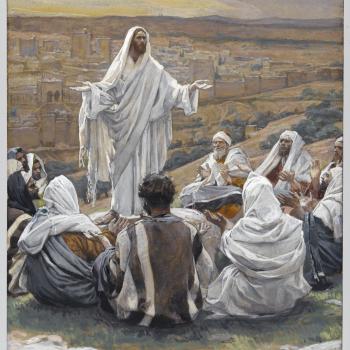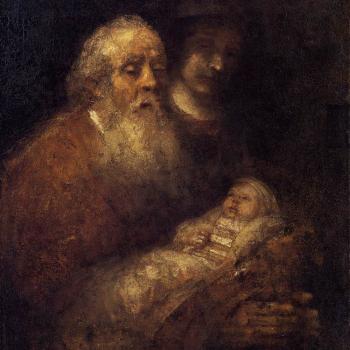
To be filled, we must become empty.
People talk about a “spiritual vacuum” in their lives, about a hungriness or a longing, and this is the starting place. We who pray Veni, Sanctu Spiritus cannot expect the Spiritus to Veni if we’re already quite pleasantly filled, thank you very much. The Spirit is not interested in being the frosting on our cake. We begin by accepting the barrenness of our lives; we begin, as Jesus reminds us, by knowing that apart from him we can do nothing.
If you’re there, then you’re ready to pray Come, Holy Spirit.
In the Gospels, the best place to begin our search for the Spirit is the first Pentecost … which is not in Acts. The first filling of the Spirit is in Luke 1, and the first to experience this filling is Mary, a nobody young girl from a hick little town on the fringes of one of the greatest empires in human history.
Luke, however, presents Mary to us as the first disciple, the first to be found with favor, and the first to be filled with grace. She becomes for us the symbol of all we’re called to be, all we’re invited to experience. When we long for a life of perfect alignment with the will of God, when we deeply desire to know God’s favor, when we want to bear Christ into the world, when we want to be filled with the Spirit in ways that lead to new life, we want to be Mary. And God willing, so we shall.
Mary’s story opens up for us the entryway to the path of the Spirit-life. The conversation between an angel, Gabriel, and a young girl, Mary, in Luke 1.26-38 is a primer in life in the Spirit.
The angel says, “Greetings, you who are highly favored.” Life in the Spirit is a response to the call of God. Our inevitable response to this idea of favor, like Mary’s, is one of “disquiet,” for it is a great challenge to be loved. Favored? Moi? You must have the wrong person. I’m a nobody. Nothing to see here. Move along.
Yet accepting God’s favor is vital to the Spirit-life. The great medieval saint, Bernard of Clairvaux, teaches us that there are four levels of love in the spiritual life. The first is when we love ourselves for our own sake. Easy peasy—it’s like a child, all about me. The second level of love is when we learn to love God for our own sake. Also not difficult—God is good, oh so good, and so we love him. (Still pretty much all about me.) The third level of love is when we learn to love God for God’s sake—beyond his blessings and his goodness and the sweetness of his presence, we love God because God is worthy. That is a more mature place of love. (Finally, our eyes are on someone other than ourselves.) But the greatest level of love, Bernard says, is when we learn to love ourselves for God’s sake. We learn to see ourselves with God’s eyes, as his beloved. We learn to love ourselves because God loves us. Even our own selves are nothing more and nothing less than treasures of God. (Now our eyes are not on ourselves at all, but on God’s heart.) Gabriel pushes Mary to accept God’s favor.
The angel says, “Do not be afraid.” Life in the Spirit calls for confidence in God. The angel deals at the outset with the first response we have toward God: fear. From Eden’s naked couple hiding in the bushes at the sound of his voice to you reading this, we all hide from God. He terrifies us, and we shrink back, a quivering mass of anger and shame and frustration and defeat. Judgment is in his hands, and we know we cannot survive it.
Yet God is forever approaching, forever calling our name. Even though we, like Mary, understand that God’s touch will pretty much wreck our plans, shatter our agendas, yet his will is the most perfect, utterly wonderful, absolutely good, grace-filled thing that could happen to us. What looked like chaos, interruption, and shame is really blessing beyond Mary’s ability to understand.
The angel says, “The Holy Spirit will overshadow you. … For nothing is impossible with God.” Life in the Spirit is an adventure in the unexpected, the impossible, and the unpredictable. In Greek, the verbs in verse 35—epeleusetai and episkiasei—give a sense of the unexpected. God is coming over you, shadowing on you, interrupting the flow of the predictable and bringing the unimagined.
We go about our lives, day by day, always calculating the future—relational, financial, political, spiritual. These choices, these decisions, these words…all should result in these outcomes. And yet God is there, the x factor in all our equations—they never quite add up the way we think they should. God interrupts.
Mary says, “How can this be?” Life in the Spirit recognizes no limitations. Mary tries to calculate the angel’s message with her virginity as part of the equation, and sees that it can’t add up. We, too, bring our limitations to the table. “How can this be,” we ask, “since I am … too old, too poor, too rich … I have too much baggage, I’ve got children in the home, I’m not educated enough, I’m divorced, I’m sick, I’m whatever.”
We’ve got to let go of our personal “how can this be” and recognize that it’s our imagination that’s limited, not God’s.
Mary says, “I am the servant of the Lord.” Life in the Spirit is first about identity, and only then about action or behavior or “results.” This isn’t about being a hero—we’re not being called to be SuperGirl. This is about aligning ourselves with God, identifying ourselves in relationship with him. Mary is not primarily Joseph’s fiancée, Anne and Joachim’s daughter, or even the Mother of Jesus. She is primarily the servant of the Lord. To be filled with the Spirit means first understanding who you are.
Mary says, “Let it be done to me according to your word.” Life in the Spirit is first a receptive posture rather than an active posture. Here we come to the heart of Mary’s response: full consent. Here Mary takes the posture that makes the filling of the Spirit possible. This is more than “permission”—it’s generous cooperation with the purposes of God. She is doing more than renting out her womb—she is entering into the mystery of God’s great intentions for the world. Mary’s consent encompasses conception, yes, and parenting, yes, but also a willingness to move with God through an unknown future in confidence that God is about something meaningful and life-giving.
We too must begin with consent, full consent. And like Mary, this must be something more than, “Okay, fine. Do what you wish with my life.” It must become, with Mary, a resolve to participate fully in the ongoing consequences of consent in full confidence that the Spirit’s overshadowing remains vital, purposeful, and fruitful.
Then the angel left her. Life in the Spirit means picking up the pieces. If the angel Gabriel had stuck around to hold Mary’s hand as she went through that embarrassing and frightening experience of telling her parents, breaking the news to Joseph, enduring the whispers at the well and the not-so-covert glances at the synagogue, life would have been a bit easier. If the angel Gabriel had made hotel arrangements in Bethlehem, it would have been nice. If the angel Gabriel had stood by her side as she watched her son in agony, it would have been good. But no. When we consent to the life of the Spirit, we are not signing up for spiritual highs. Life in the Spirit is often a slog. There, I’ve said it. It’s a long, slow, and often painful trek through the shadows the Spirit casts as he goes about weaving divine will through the warp and woof of our lives.
And yet we consent, for we are empty and we long to be filled. Veni, Sanctu Spiritus. Come, Holy Spirit, Lord and Giver of Life.
Suggestion for practice: I’m assuming you pray regularly. “Do not neglect so great a good,” as Teresa of Avila wrote. But do this one extra thing, a very small thing really. At the close of every time of prayer, just before you say Amen, say this: “Let it be done to me according to your word.” Make an active movement of consent every time you pray. Make consent the culmination of your questions, intercessions, laments, praises, confessions. Try it—this little practice has changed my prayer life. No, my life.












